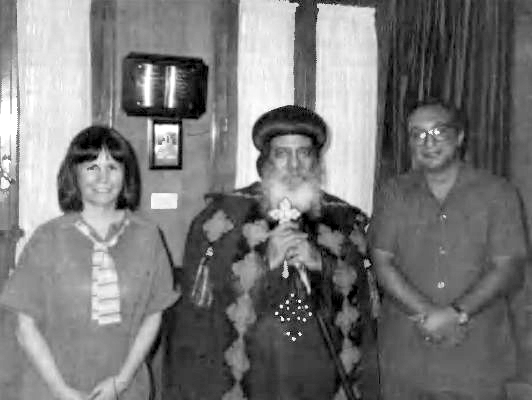![]()
The Words of the Gottesman Family
|
|
The Words of the Gottesman Family |

Pope
Shenoda III of the Coptic Church with Maureen Gottesman and Dr. Nabil
Khalil.
"In that day shall there be an
altar to the Lord in the midst of the land of Egypt, and a pillar to
the Lord at its border.
It will be a sign and a witness to the
Lord of hosts in the land of Egypt: when they cry to the Lord because
of oppressors He will send them a savior, and He will defend them and
deliver them."
Is 19:19-20
Coptic Christians represent approximately 20 percent of the population of Egypt (12 million members). There are also Coptic communities in many countries throughout the Middle East, particularly in Sudan and Ethiopia. In addition, there are 27 Coptic churches in the United States and 32 churches in Canada that serve over 150,000 Coptic Christians in North America.
On June 22, 1985, my husband Walter Gottesman, regional leader of the North Africa region, Dr. Nabil Khalil (a Unificationist of Coptic origin), and I had an hour-long private meeting with Pope Shenoda III, the revered leader of the Coptic Christian Church worldwide. The meeting took place in Pope Shenoda's office at the Abbysia Cathedral in Cairo, Egypt.
During the meeting we presented Pope Shenoda with a booklet about the Assembly of World Religions, the proceedings of the 1981 God Conference, a Youth Seminar on World Religions brochure, and a copy of a New York City Tribune article written by Walter Gottesman about the apparitions of Mary, the mother of Jesus, seen at a Coptic Church in Cairo in 1967. Pope Shenoda expressed great interest and admiration for the Unification movement and all its ecumenical activities. He said that he would like to send a Coptic representative or delegation to the Assembly of World Religions in November 1985.
During the same meeting, Pope Shenoda accorded a rare interview about the history of the Coptic Church, his experience during his 40 months of imprisonment, and his efforts to foster Moslem- Christian dialogue. (The resulting article is to be published in the New York City Tribune in the future.)
Pope Shenoda is a dynamic, highly educated, and spiritually inspired man, prepared by God to work toward religious unity during the time True Parents are on earth. He was the first Coptic pope in 15 centuries to meet with the pope of the Roman Catholic Church. Through Pope Shenoda's efforts, the Coptic Church became one of the original members of the World Council of Churches and is also a member of the Canadian Council of Churches. He is in communication with many Christian churches, including the Kimbangist Church in Zaire. He has met with key Moslem religious leaders and some Moslem heads of state, including Libya's president, Muammar el Qaddafi, in efforts to foster Moslem-Christian dialogue.
The Coptic Church traces its origins to Saint Mark the Apostle, the first Christian missionary to Egypt. The monastic movement was founded in the third century A.D. in Egypt by Saint Anthony, a Coptic Christian, and then spread throughout the Christian world. At the time of the Arabic conquest in the seventh century there were over 70,000 monks living in the monasteries in the Egyptian desert. The Coptic Church has survived numerous waves of persecution throughout its history -- during the period of the Roman Empire, during the Islamic conquest, under the Ottoman Empire, and even in modem times.
In 1967, at a time when President Gamal Abdel Nasser had planned a large- scale persecution of Christians to divert the people's attention away from the failing economic and social policies of his socialist regime, Mary, the mother of Jesus, appeared to hundreds of Christians and Moslems alike over a period of several months at a small Coptic Church in Cairo. Numerous miracles were recorded. Many people were healed spiritually and physically, and President Nasser was forced to cancel his plans.
Pope Shenoda III himself was imprisoned shortly before President Sadat's assassination in October 1981, on nebulous charges of encouraging too much Coptic consciousness, and remained under house arrest in Wadi Natrun Monastery for 40 months. He was freed early this year by President Hosni Mubarak, but is still unable to travel abroad.
During our meeting he said that a person of faith can be imprisoned physically but never spiritually, and that during his own imprisonment he always maintained hope and a sense of humor. He said, with a twinkle in his eye, that Heavenly Father had given him a sort of "sabbatical" during which time he could meditate and pray more deeply and write a number of books that he had been wanting to write for a long time. He said he felt that people of God should witness to their faith and not worry about the consequences; that when one door closes, Heavenly Father always has other doors to open.
He cited the example of Saint Basil, a Coptic monk who was persecuted, imprisoned, and exiled, who asked his captors, "Are you going to send me to a country or place where there is no God? With faith in God there is no such thing as exile!" Pope Shenoda could certainly understand True Father's unjust imprisonment, and also how God could use True Father's offering to help bring Christians together for the cause of religious freedom.
In April True Father told us that we could expect miracles within the next few months. We had wanted to meet Pope Shenoda for a long time but were unable to because of his imprisonment. We feel that being able to meet with him at this time was one of the "miracles" True Father told us to expect, opening the door to communication with millions of Coptic Christians worldwide.